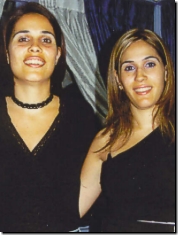
Orit Tsarafi (left) and sister
Liat Bitton. | Life in Jerusalem Normal:
Joy Mingled with Tears  OTHING stops the people of Jerusalem from living normal lives. On a warm Saturday night in June, some 32 relatives and friends gather at Ahavat Hayam, a popular fish restaurant, to toast Orit Tsarafi on her 30th birthday. They sing, they talk, they laugh. OTHING stops the people of Jerusalem from living normal lives. On a warm Saturday night in June, some 32 relatives and friends gather at Ahavat Hayam, a popular fish restaurant, to toast Orit Tsarafi on her 30th birthday. They sing, they talk, they laugh.
This being Israel, laughter is leavened with tears. Orit’s husband isn’t here. He died in a training accident at an army base, leaving her with an eight-year-old daughter. Her mother isn’t here. She died 13 years ago when a terrorist blew up Bus 104 between Tel Aviv and Jerusalem. Orit’s cousin, Roi, 21, is here. He got a weekend pass from his Givati Brigade in Gaza. While partying with his cousins, Roi gets a call from his base: two of his army buddies, ages 20 and 22, were just killed in a terrorist ambush. This has become a normal way to celebrate a birthday in Israel – with laughter and with tears. If you would only travel to Israel you would see for yourself how the people are living in normal fashion. If some are fearful, they don’t show it. 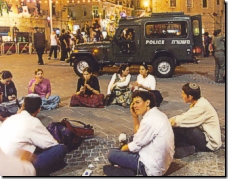
Young people hang out in Jerusalem’s
popular Zion Square. | Zion Square is packed with young people, as it is every Saturday night. They are determined to go out of their apartments and socialize on the street, as is their custom every weekend. There is a terrorist alert, security is intense, but the young people of the Holy City are determined not to allow threats to crimp their style. Here a small knot of boys and girls sit on the cement pavement, improvising with drums and clarinet. There a cluster of punk characters laugh and kibitz. All under the watchful eye of heavily armed soldiers patrolling the perimeter. The shops on Ben Yehuda Street, site of terrorist mayhem in the past, are open this Saturday evening, but sparsely attended. Shopkeepers complain about the business slump. Mark Berger, Ricky Heller, David Rabinowitz and Frank Cumsky – part of a solidarity mission of 17 from Young Israel of East Brunswick, N.J. – are enjoying falafel and Cokes on a bench in the street. “We went to Hebron, Kiryat Arba and Kever Rachel,” Berger said. “We aren’t afraid.” 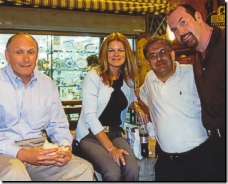
Mark Berger, Ricky Heller,
David Rabinowitz and Frank Cumsky
from East Brunswick, New Jersey,
enjoy falafel and Cokes on Ben Yehuda
Street. | Heller was schlepping several plastic bags. “I did a lot of shopping,” she said, proud of her contribution in this depressed economy. Tsion Ben-David, in charge of the North America desk at the Ministry of Tourism, praises the few visitors who come from the U.S. Trouble is, the overwhelming majority of American Jews aren’t coming. Only the Orthodox and evangelical Christians come. At breakfast in the King David Hotel, I meet three men from California here on a two-week volunteer program to help the Israel Defense Forces. They do tank maintenance and check gas masks at an IDF base in Ashkelon. “There are 50 of us from all over the world,” says Ivan Samuels, who owns a window blind company in Palm Desert, Calif. “The food is terrible, we sleep five to a room that’s small, no air condition. Yet we’re glad we came. “We have no reason to be afraid. We were in Tel Aviv. They have more security than people.” In Beersheba I run into an old friend. Esther Sharon formerly worked in New York, fundraising for Yivo and Assaf Harofeh Hospital. She made aliyah six years ago. Her son, 23, and daughter, 21, live in Tel Aviv. She admits she is fearful, advising her children not to come visit her. “I don’t want them to take the bus. I want to minimize the risks.” Yaacov Turner, the mayor of Beersheba, is resigned to the situation. “Suicide bombers – no one can solve it. We live. You see it in the streets. We don’t walk around afraid. Our history is strong.” The mayor is more focused on reclaiming the desert. The big problem there, he says, is that the Bedouin are slowly taking up more of the Negev. “They go where their sheep go. They are spreading all over the Negev. The government must build cities for them. They have seven cities already.” The Negev, he said, is 65 percent of Israel, but population is only 9 percent. “We say to our best friends in the world, the Jews in the Diaspora, come and help us develop the land.” 
Yaacov Turner, mayor of
Beersheba. | Ofir Gendelman, 31, a spokesman for the Ministry of Foreign Affairs, was not overly optimistic about the terror situation. “We are in a deadlock,” he said. “Arafat doesn’t have the capability to stop terrorism. What we are facing is a Palestinian Authority that is crumbling and a leader who refuses to pursue peace. “We are in a war of attrition that shows no end. I personally feel there will never be peace. There are no peaceniks in the Arab community. The situation is hopeless. “A suicide bombing every four days has become normal.” Nevertheless, Gendelman says people still go on with their lives. “We want Jews and Christians to come and see that we are strong. We are fighting for our homes.” On a side trip to the Ayalon Institute, kibbutz member Maya Ronen, 24, explains how the Haganah turned a couple of work houses into an underground munitions factory, right under the very noses of the British mandate authorities. While several kibbutzniks baked bread, sewed clothes and did the laundry, others were busy making bullets deep in the secret cellars. The British never suspected what went on underneath. 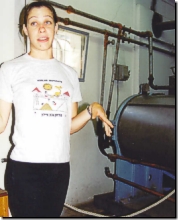
Maya Ronen explains how
Haganah made bullets
underground during the British
mandate. | One underground worker gazed at a pretty co-worker while cutting the bullets to size, and sliced off a finger. “From that day on,” Maya says, “they called him the mohel.” Last year, at the end of her lecture, an old man in a group told Maya, “I am that mohel.” He introduced his wife, the girl for whom he sacrificed a finger. In Tel Aviv’s famed Carmel Market, there’s not an armed guard in sight. Very few tourists but plenty of local customers. I meet two couples, in their 70s, who are not afraid to drive all the way from Haifa to shop in this vast open-air food mart. Shenkin Street, with its numerous artsy galleries, hip shops and trendy eateries, is devoid of foreign visitors. 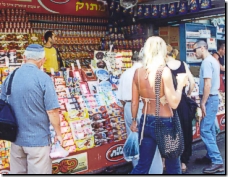
Israelis shopping at outdoor
Carmel Market in Tel Aviv. | At the trendy Café Lenzner, an elderly widow is sitting at an outdoor table, nursing an espresso. Her name is Dvora, whose husband died 10 years ago. “Can’t stay home alone,” she says. “Nobody does that. We live…hardly.” The café owner tells me that his place was always crowded before the intifada began 21 months ago. “This is the country of all the Jews,” he says. “So come and help us guard the country together.” 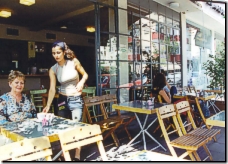
Café Lenzner on Tel Aviv’s trendy
Shenkin Street yearns for crowds of
yesteryear. | On the eve of my departure, Aviva Lavie of EL AL’s marketing department iterated the mantra of most Israelis I talked to: “We live here, we party here, we love it here.” She admits, though, that this year is EL AL’s worst since 1993. Flights are packed, but there are fewer of them. I was in a hurry to get to Ben-Gurion, but she said not to worry. “You won’t find a big line at check-in. Israelis line up at Duty Free.” On my return flight to New York, former UN Ambassador Dore Gold, Prime Minister Ariel Sharon’s spokesperson, settles into first class with five other star power types, while I make my way to the economy section with 238 other frugal travelers. I don’t mind. The airline’s new Boeing 777-200 aircraft has spacious seats, unlike the 747 whose seats are really cramped. 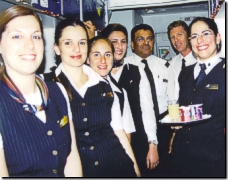
Eliezer Chebach, rear left, with his flight
attendants, including Efrat Aharoni,
right with tray. | Eliezer Chebach, 55, the manager of inflight service aboard Flight 001, introduces me to his cabin crew of 14. They are mainly students, working as flight attendants for five years when “they make good money and see the world.” There are other perks. Flight attendant Efrat Aharoni says she fell in love with a passenger and is now married two years. Chebach shows no fear of the situation on the ground. “During all these terrorist attacks,” he says, “we survived due to our superior security procedures.” |